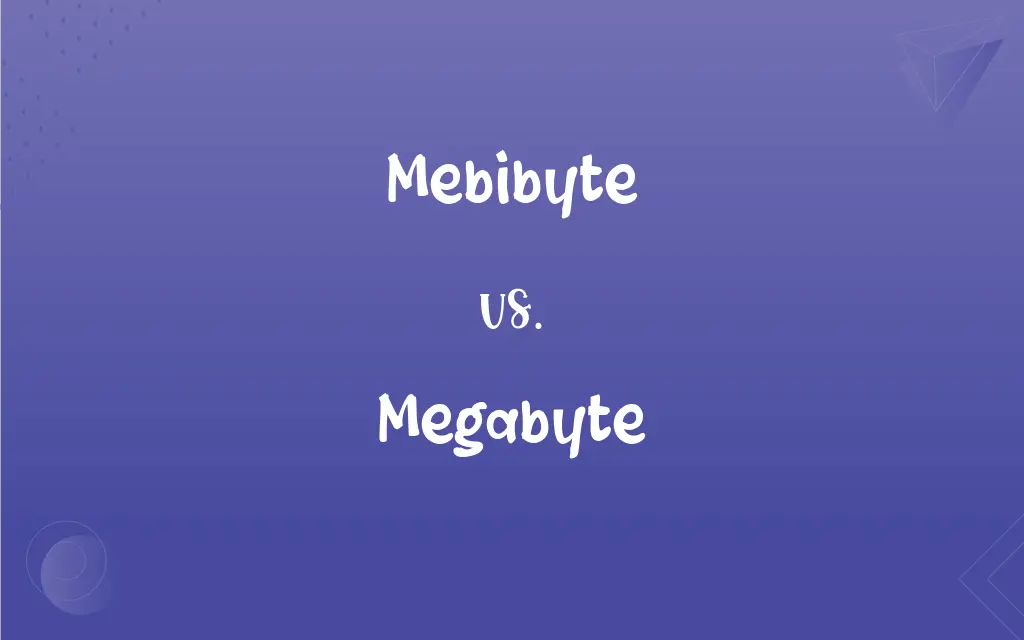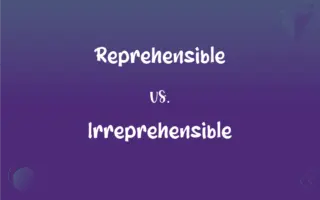Mebibyte vs. Megabyte: What's the Difference?
By Aimie Carlson || Updated on May 23, 2024
A mebibyte (MiB) is 2^20 (1,048,576) bytes, while a megabyte (MB) is 10^6 (1,000,000) bytes, making them distinct units of digital information.

Key Differences
A mebibyte (MiB) is a unit of digital information storage that equals 1,048,576 bytes. It is part of the binary system used primarily in computing and digital storage contexts. On the other hand, a megabyte (MB) is a unit of digital information storage in the decimal system, equivalent to 1,000,000 bytes, and is often used in contexts where data is measured in powers of ten, such as internet data usage and file sizes.
The distinction between mebibytes and megabytes arises from their different base calculations. Mebibytes are based on powers of two, with 1 MiB being 2^20 bytes. In contrast, megabytes are based on powers of ten, with 1 MB being 10^6 bytes. This difference means that a mebibyte is slightly larger than a megabyte.
Mebibytes are commonly used in technical fields where precision is crucial, such as in computer memory (RAM) specifications and some storage devices. Megabytes, however, are often used in more general contexts, such as file sizes on consumer devices and internet bandwidth, where the decimal system is more intuitive for general users.
In terms of practical application, a file reported as 5 MB by an operating system might be slightly smaller in binary terms (mebibytes) when examined closely. This discrepancy can sometimes cause confusion, particularly in data storage and transfer where both units might be used interchangeably without clear distinction.
Both units are important in their respective contexts, with mebibytes providing precise, binary-based measurements useful in computing, and megabytes offering easier-to-understand, decimal-based measurements for general use.
ADVERTISEMENT
Comparison Chart
Definition
2^20 (1,048,576) bytes
10^6 (1,000,000) bytes
Base
Binary (base 2)
Decimal (base 10)
Usage
Technical computing and storage
General data measurement
Common Contexts
RAM, precise storage calculations
File sizes, internet data
Size Comparison
Larger (1 MiB = 1,048,576 bytes)
Smaller (1 MB = 1,000,000 bytes)
ADVERTISEMENT
Mebibyte and Megabyte Definitions
Mebibyte
Equals 1,048,576 bytes.
This file is exactly 4 MiB in size.
Megabyte
Decimal-based measurement.
Download speeds are typically measured in MB per second.
Mebibyte
Unit of digital information storage, 2^20 bytes.
The RAM module has a capacity of 256 MiB.
Megabyte
Equals 1,000,000 bytes.
My internet plan offers 500 MB of data per month.
Mebibyte
Used in computing and storage contexts.
The software requires at least 512 MiB of memory.
Megabyte
Used in general data measurement.
The MP3 file is approximately 3 MB.
Mebibyte
Binary-based measurement.
The hard drive's capacity is listed in MiB.
Megabyte
Unit of digital information storage, 10^6 bytes.
The document size is 5 MB.
Mebibyte
Precise and technical applications.
System memory is often measured in MiB for accuracy.
Megabyte
Common in everyday contexts.
Smartphone storage is often described in MB and GB.
Mebibyte
(computing) Strictly, 220 (10242, or 1,048,576) bytes or 210 (1024) kibibytes, as opposed to a megabyte.
Megabyte
A unit of computer memory or data storage capacity equal to 1,048,576 (220) bytes.
Megabyte
A unit of information equal to one million (1,048,576) bytes
Megabyte
One million bytes. See Usage Note at gigabyte.
Megabyte
One million (106, or 1,000,000) bytes or 1,000 kilobytes.
Megabyte
A mebibyte.
FAQs
What is a megabyte?
A megabyte (MB) is a unit of digital information storage equal to 1,000,000 bytes.
What is a mebibyte?
A mebibyte (MiB) is a unit of digital information storage equal to 1,048,576 bytes.
Where is the term mebibyte commonly used?
In computing and digital storage contexts, where precise binary measurements are required.
How do I convert mebibytes to megabytes?
Multiply the number of mebibytes by approximately 1.048576 to get the number of megabytes.
Which is larger, a mebibyte or a megabyte?
A mebibyte is larger, consisting of 1,048,576 bytes compared to a megabyte's 1,000,000 bytes.
Why are there two different units, mebibyte and megabyte?
They arise from different counting systems: binary for mebibytes and decimal for megabytes, used in different technical contexts.
How many bytes are in a mebibyte?
There are 1,048,576 bytes in a mebibyte.
How do mebibytes and megabytes differ?
Mebibytes are based on binary (2^20), while megabytes are based on decimal (10^6), making mebibytes slightly larger.
Is a mebibyte used more often than a megabyte?
It depends on the context; mebibytes are used more in technical fields, while megabytes are used more generally.
Where is the term megabyte commonly used?
In general data measurement, such as internet data usage and consumer file sizes.
Why do computer operating systems sometimes use mebibytes instead of megabytes?
For precision in memory and storage calculations, as mebibytes reflect the binary nature of computing.
What does the prefix "mebi-" mean?
"Mebi-" denotes a binary multiple of a unit, specifically 2^20 (1,048,576).
Are mebibytes and megabytes both used in storage devices?
Yes, but mebibytes are often used for precise technical specifications, while megabytes are used in general descriptions.
How many bytes are in a megabyte?
There are 1,000,000 bytes in a megabyte.
How do I convert megabytes to mebibytes?
Divide the number of megabytes by approximately 1.048576 to get the number of mebibytes.
Are internet speeds measured in mebibytes or megabytes?
Internet speeds are typically measured in megabytes (MB) per second.
What does the prefix "mega-" mean?
"Mega-" denotes a decimal multiple of a unit, specifically 10^6 (1,000,000).
Why might a file size appear different in mebibytes versus megabytes?
Due to the different bases (binary vs. decimal), the reported sizes can vary slightly.
Is there a standard preference for using mebibytes or megabytes?
It depends on the context: mebibytes for technical precision in computing, and megabytes for general consumer contexts.
Can megabytes and mebibytes be used interchangeably?
Not exactly; they measure slightly different amounts and are used in different contexts.
About Author
Written by
Aimie CarlsonAimie Carlson, holding a master's degree in English literature, is a fervent English language enthusiast. She lends her writing talents to Difference Wiki, a prominent website that specializes in comparisons, offering readers insightful analyses that both captivate and inform.































































